
Video Editing Blogs
"Let's Learn, Explore, and Connect to the World"

Learning Video Editing: School vs. Online Courses
- Tokita Akira
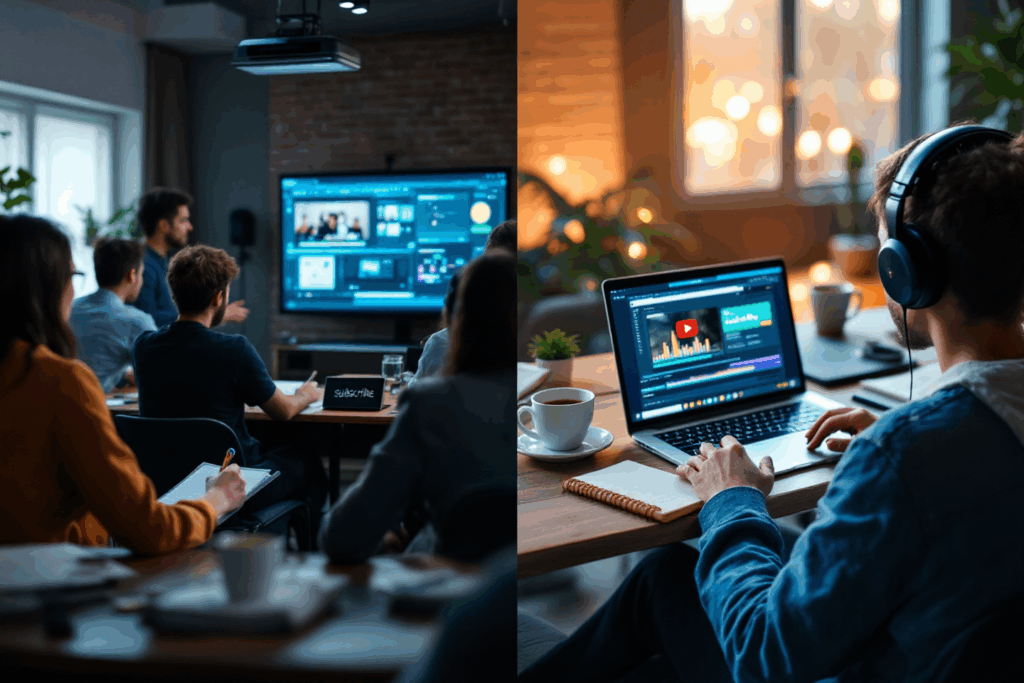
Introduction

In the rapidly evolving world of digital media, video editing has emerged as a skill in high demand. Whether it’s for filmmaking, marketing, content creation, or social media, the ability to craft compelling visual stories is more valuable than ever. For aspiring video editors, one critical question often arises: How should one study video editing? Is it better to enroll in a traditional school or are online courses sufficient?
This article aims to explore the two primary pathways to learning video editing: traditional school-based education and online learning platforms. Both avenues offer unique advantages and come with their own set of challenges. We will delve into the benefits and drawbacks of each, helping you decide which path aligns best with your learning preferences, career objectives, and available resources.
As the demand for skilled video editors continues to grow, understanding the most effective way to acquire these skills becomes crucial. Whether you dream of working in a major film studio, excelling in a corporate environment, or freelancing, the journey begins with education. Let’s compare and contrast these learning methods to help you embark on a path that suits your aspirations in the world of video editing.
Traditional School-Based Learning for Video Editing
For many aspiring video editors, attending a traditional school, such as a university or technical college, is a preferred route. This path offers a structured educational experience. Let’s explore the advantages and disadvantages:
Advantages

- Structured Curriculum: Traditional schools typically offer a well-designed curriculum that covers a wide range of topics, from the basics of video editing to advanced techniques, ensuring a comprehensive education.
- Hands-On Experience: Many schools provide access to professional-grade equipment and software, giving students the opportunity to gain practical experience in a controlled environment.
- Networking Opportunities: Being part of a school community allows students to connect with peers, educators, and visiting professionals, offering valuable networking opportunities that can be beneficial in their future careers.
- Accreditation and Certification: Completing a program from a recognized institution often results in a degree or certification, which can be advantageous when seeking employment, as it validates your education to employers.
Disadvantages

- Cost: One of the significant drawbacks of traditional schooling is the cost. Tuition fees can be high, and there may be additional expenses for resources and equipment.
- Location and Accessibility: Traditional education often requires physical attendance, which can be a limitation for those who do not have easy access to such institutions or who cannot relocate.
- Rigidity: School programs usually have fixed schedules and curriculums, offering less flexibility compared to online courses, which can be a challenge for those who need to balance studies with other responsibilities.
Traditional school-based learning offers a comprehensive and immersive educational experience but requires a significant commitment in terms of time, money, and often location.
Online Learning for Video Editing
Online learning platforms have revolutionized how we acquire new skills, including video editing. They offer an accessible, flexible, and often more affordable way to learn. Let’s examine the pros and cons:
Advantages

- Flexibility and Convenience: One of the biggest draws of online learning is the flexibility it offers. Students can learn at their own pace and on their own schedule, which is ideal for those balancing other commitments.
- Variety of Resources: There is a vast array of online courses available, ranging from beginner to advanced levels, and covering various styles and techniques in video editing. This variety allows learners to choose courses that best fit their interests and skill levels.
- Cost-Effective: Online courses are generally more affordable than traditional school programs. Many platforms also offer free trials, and there are numerous free resources available for beginners.
- Up-to-Date Content: Online courses are often updated more frequently than traditional school curriculums, ensuring that learners are getting the most current information and learning the latest techniques.
Disadvantages

- Self-Discipline Required: The flexibility of online learning requires a high degree of self-motivation and discipline. Without the structure of a traditional classroom, some learners might find it challenging to keep up with their studies.
- Limited Hands-On Experience: While online courses provide theoretical knowledge and demonstrations, they often lack the hands-on experience of using professional equipment, which can be a crucial part of learning video editing.
- Networking Challenges: Unlike traditional schools, online courses offer fewer opportunities for face-to-face networking with peers and industry professionals, which can be a vital part of building a career.
- Online learning platforms provide an accessible and flexible way to gain video editing skills, especially beneficial for self-motivated learners and those seeking to learn specific skills or techniques.
Blended Learning Approach
A blended learning approach can offer the best of both worlds, combining the structured, interactive environment of traditional schooling with the flexibility and accessibility of online courses. Here’s how a blended approach can be beneficial for learning video editing:
Combining Resources and Experiences

- Structured Learning with Flexibility: Blended learning allows students to benefit from the structured curriculum of traditional schooling while enjoying the flexibility of supplementing their education with online resources.
- Access to Equipment and Online Resources: Students can gain hands-on experience with professional equipment in a traditional school setting, while also accessing a wide variety of online tutorials and courses to enhance their learning.
- Networking and Online Community Engagement: Blended learning provides opportunities for in-person networking, essential in the video editing industry, and encourages participation in online communities and forums for broader engagement.
Implementing Blended Learning

- Enrolling in Hybrid Programs: Some educational institutions offer hybrid programs that combine in-person classes with online coursework, providing a comprehensive learning experience.
- Self-Directed Blended Learning: Learners can also create their own blended learning experience by enrolling in a traditional course while independently seeking out online resources and tutorials to supplement their education.
- Workshops and Online Follow-up: Attending workshops or short courses for hands-on experience, followed by online courses for further study and practice, can be an effective blended learning strategy.
A blended learning approach in video editing allows learners to tailor their educational journey to their individual needs, taking advantage of both traditional and digital learning platforms.
Conclusion

Choosing between traditional school and online learning for video editing depends on various factors, including your personal learning style, schedule flexibility, budget, and career goals. Traditional schools offer a structured, immersive experience with hands-on training and networking opportunities, while online courses provide flexibility, a wide range of learning materials, and are often more budget-friendly.
For many, a blended approach that combines the strengths of both methods could be the most effective way to learn video editing. It allows for a customizable learning experience that can adapt to changing needs and goals.
In the end, whether you choose traditional schooling, online courses, or a mix of both, the key is to stay committed to learning, practicing, and continuously developing your skills in the ever-evolving field of video editing.
Latest Blogs

Past Perfect Tense 1
English Blogs “Let’s Learn, Explore, and Connect to the World” Past Perfect Tense 1 I. Introduction to the Past Perfect Tense in English The Past

The Psychology of Happiness: How to Cultivate Joy in Your Daily Life
Mental and Emotional Health “Let’s Learn, Explore, and Connect to the World” The Psychology of Happiness: How to Cultivate Joy in Your Daily Life Introduction
Check out our books and more!

A Beginner's Guide to Video Editing: Be a Pro in Just 24 Hours
Discover your inner editing abilities with this complete guide made for beginners to master the art of video editing smoothly. ‘A Beginner’s Guide to Video Editing: Be a Pro in Just 24 Hours’ is your way to discover the secrets of professional-grade editing within a day.
Check out our Blogs!
Read our everyday blogs and gain new knowledge, skills, and inspiration to support your learning journey here in SEKAEL.


Explore Mental Health Blogs to gain insights and tips on self-care, emotional balance, and personal well-being.



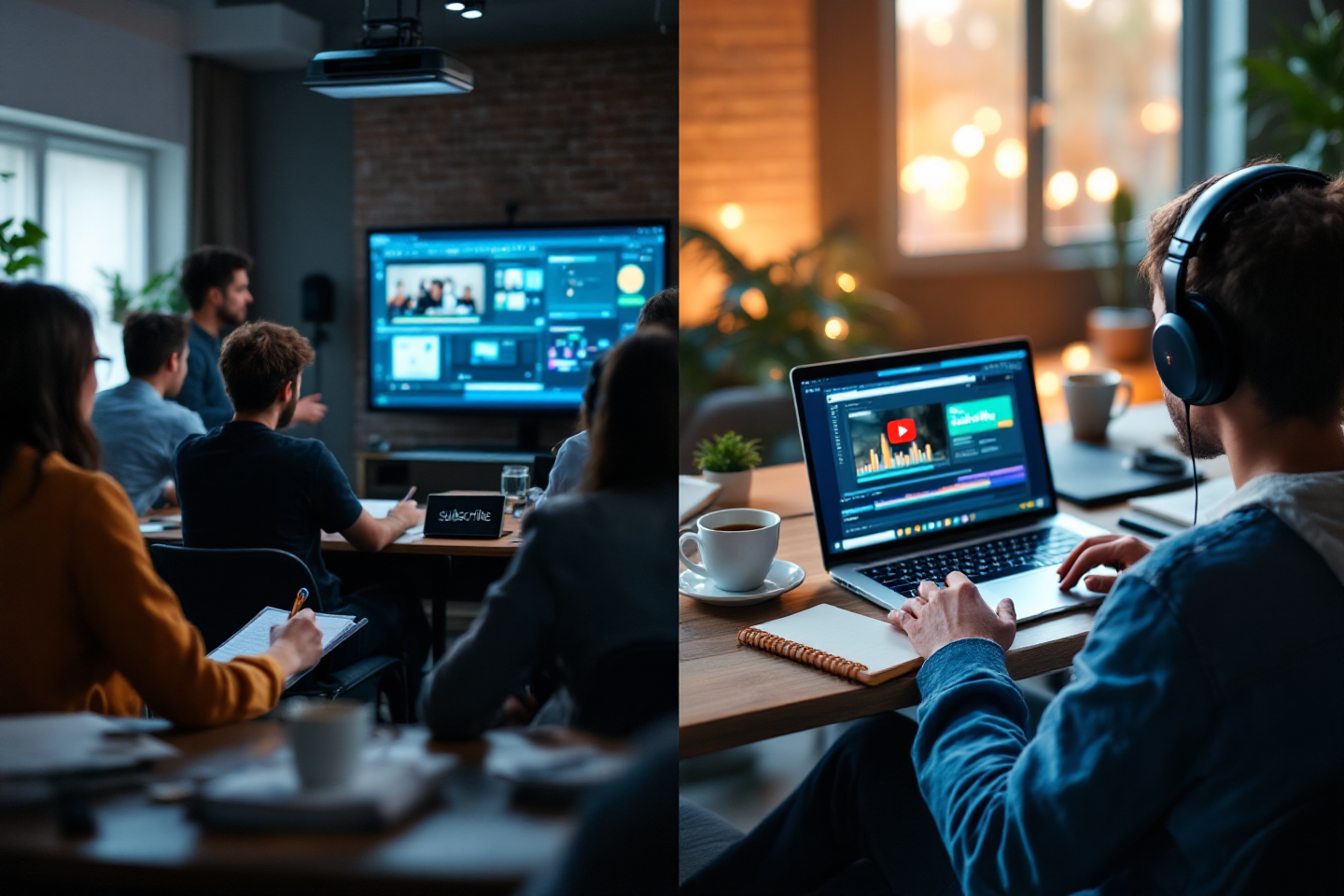
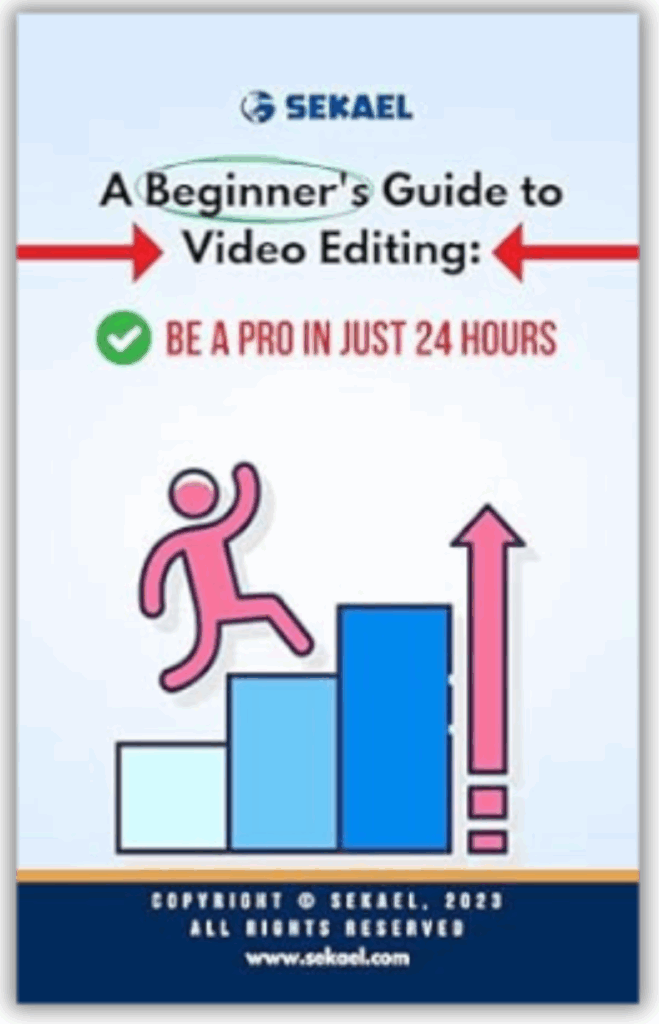


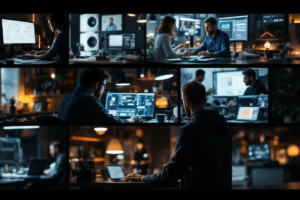




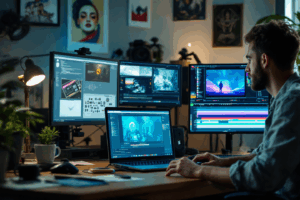




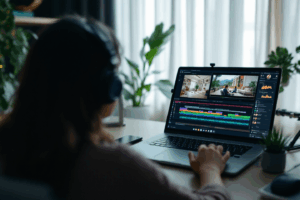

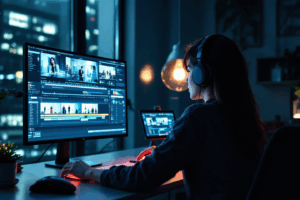
 Freelance Video Editing:
Freelance Video Editing: Full-Time Video Editing Jobs: Full-time positions provide a steady income and often come with additional benefits like health insurance, paid vacation, and retirement plans. Salaries for full-time positions can vary based on the company, industry, and location. Full-time roles also offer career development opportunities and a more stable work environment.
Full-Time Video Editing Jobs: Full-time positions provide a steady income and often come with additional benefits like health insurance, paid vacation, and retirement plans. Salaries for full-time positions can vary based on the company, industry, and location. Full-time roles also offer career development opportunities and a more stable work environment. Making the Choice: The decision between freelancing and full-time employment depends on personal preferences, career goals, and tolerance for income variability. Some video editors may start freelancing and transition into full-time roles, or vice versa, depending on their career progression and life circumstances.
Making the Choice: The decision between freelancing and full-time employment depends on personal preferences, career goals, and tolerance for income variability. Some video editors may start freelancing and transition into full-time roles, or vice versa, depending on their career progression and life circumstances.
 Embarking on a career in video editing presents a world of opportunities, and understanding the salary landscape is an essential part of this journey. As we’ve explored, video editing salaries vary significantly across different countries, influenced by factors such as the cost of living, industry demand, and the editor’s experience and skill set.
Embarking on a career in video editing presents a world of opportunities, and understanding the salary landscape is an essential part of this journey. As we’ve explored, video editing salaries vary significantly across different countries, influenced by factors such as the cost of living, industry demand, and the editor’s experience and skill set. Finally, remember that the field of video editing is continually evolving. Staying updated with industry trends, continuously enhancing your skills, and understanding your worth are crucial to advancing in this career and negotiating fair compensation.
Finally, remember that the field of video editing is continually evolving. Staying updated with industry trends, continuously enhancing your skills, and understanding your worth are crucial to advancing in this career and negotiating fair compensation.







 In the dynamic world of digital media, video editing has emerged as a skill in high demand. With the proliferation of online content, advertising, and corporate branding increasingly reliant on video, the need for skilled video editors has never been greater. However, for beginners armed with video editing skills, the question often arises: How does one break into this competitive field and land a job?
In the dynamic world of digital media, video editing has emerged as a skill in high demand. With the proliferation of online content, advertising, and corporate branding increasingly reliant on video, the need for skilled video editors has never been greater. However, for beginners armed with video editing skills, the question often arises: How does one break into this competitive field and land a job? This article is crafted to guide you, the aspiring video editor, on your journey to securing a position in this exciting and evolving industry. Whether you dream of cutting trailers for the next blockbuster movie, crafting compelling advertisements, or producing engaging content for digital platforms, understanding the pathway to employment is key. We’ll explore the landscape of the video editing job market, offer tips on building a strong foundational skill set, and provide practical advice on creating a portfolio, gaining experience, and navigating the job application process.
This article is crafted to guide you, the aspiring video editor, on your journey to securing a position in this exciting and evolving industry. Whether you dream of cutting trailers for the next blockbuster movie, crafting compelling advertisements, or producing engaging content for digital platforms, understanding the pathway to employment is key. We’ll explore the landscape of the video editing job market, offer tips on building a strong foundational skill set, and provide practical advice on creating a portfolio, gaining experience, and navigating the job application process. Types of Employment:
Types of Employment: Industries in Demand:
Industries in Demand: Emerging Trends:
Emerging Trends: Geographical Hotspots:
Geographical Hotspots: Salary Expectations:
Salary Expectations: Required Skills and Qualifications:
Required Skills and Qualifications:
 By building a strong foundation in video editing, you not only enhance your technical abilities but also develop a deeper understanding of the creative aspects of storytelling. This combination of skills is what will make your work stand out to potential employers and clients.
By building a strong foundation in video editing, you not only enhance your technical abilities but also develop a deeper understanding of the creative aspects of storytelling. This combination of skills is what will make your work stand out to potential employers and clients.
 Breaking into the field of video editing often requires not just skill, but also experience and industry exposure. Here are strategies to help you gain valuable experience and make your mark in the video editing world:
Breaking into the field of video editing often requires not just skill, but also experience and industry exposure. Here are strategies to help you gain valuable experience and make your mark in the video editing world: Gaining practical experience and exposure is as important as honing your technical skills. It builds your confidence, expands your professional network, and enhances your resume, making you a more attractive candidate to potential employers.
Gaining practical experience and exposure is as important as honing your technical skills. It builds your confidence, expands your professional network, and enhances your resume, making you a more attractive candidate to potential employers.
 Stay Updated with Software and Tools:
Stay Updated with Software and Tools: Explore Advanced Techniques and Styles:
Explore Advanced Techniques and Styles: Attend Workshops and Industry Conferences:
Attend Workshops and Industry Conferences: Seek Mentorship and Feedback:
Seek Mentorship and Feedback: Pursue Further Education:
Pursue Further Education: Explore New Areas and Niches:
Explore New Areas and Niches: Set Long-Term Goals and Career Path:
Set Long-Term Goals and Career Path:





 Diversification of Skill Set:
Diversification of Skill Set: Enhanced Resume and Portfolio:
Enhanced Resume and Portfolio: Social Media and Digital Marketing Roles:
Social Media and Digital Marketing Roles: Cross-Functional Collaboration:
Cross-Functional Collaboration: Freelance and Consulting Opportunities:
Freelance and Consulting Opportunities: Evolving with Industry Trends:
Evolving with Industry Trends:
 By integrating video editing skills into your marketing strategies, you can create content that not only captivates your audience but also drives tangible business results. Whether it’s through social media, advertising, or customer engagement, the power of a well-edited video in the business context is undeniable.
By integrating video editing skills into your marketing strategies, you can create content that not only captivates your audience but also drives tangible business results. Whether it’s through social media, advertising, or customer engagement, the power of a well-edited video in the business context is undeniable. For entrepreneurs and startups, video editing is more than a skill—it’s a strategic tool that can drive business success. In the entrepreneurial journey, where resources are often limited and impact is crucial, being able to produce high-quality videos in-house can be a game-changer. Here’s how video editing plays a vital role in entrepreneurship:
For entrepreneurs and startups, video editing is more than a skill—it’s a strategic tool that can drive business success. In the entrepreneurial journey, where resources are often limited and impact is crucial, being able to produce high-quality videos in-house can be a game-changer. Here’s how video editing plays a vital role in entrepreneurship: For the modern entrepreneur, video editing is not just a way to cut costs; it’s a powerful strategy to communicate your vision, engage with your audience, and build a lasting brand in the competitive business landscape.
For the modern entrepreneur, video editing is not just a way to cut costs; it’s a powerful strategy to communicate your vision, engage with your audience, and build a lasting brand in the competitive business landscape. Flexibility in Remote Roles:
Flexibility in Remote Roles: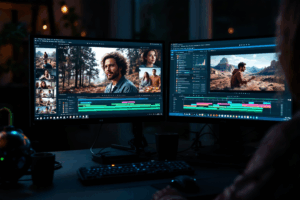 Freelance Video Editing Opportunities:
Freelance Video Editing Opportunities: Building a Freelance Portfolio:
Building a Freelance Portfolio: Expanding Client Services:
Expanding Client Services: Networking and Collaboration:
Networking and Collaboration: Online Content Creation:
Online Content Creation: Skill Development and Up-to-Date Knowledge:
Skill Development and Up-to-Date Knowledge:
 In corporate communication and training, video editing is not just a way of packaging content; it’s a means to ensure messages are delivered effectively, learning is facilitated, and engagement is maximized. For professionals in these fields, video editing skills are becoming increasingly essential.
In corporate communication and training, video editing is not just a way of packaging content; it’s a means to ensure messages are delivered effectively, learning is facilitated, and engagement is maximized. For professionals in these fields, video editing skills are becoming increasingly essential. As we conclude this exploration into the multifaceted role of video editing in professional settings, it’s clear that this skill is more than just an artistic endeavor. It’s a critical tool in today’s digital-first world, essential for enhancing career prospects, boosting business growth, and improving communication and training effectiveness.
As we conclude this exploration into the multifaceted role of video editing in professional settings, it’s clear that this skill is more than just an artistic endeavor. It’s a critical tool in today’s digital-first world, essential for enhancing career prospects, boosting business growth, and improving communication and training effectiveness. Whether you are a budding entrepreneur, a freelancer, a corporate professional, or someone looking to upskill in the digital age, investing time in learning video editing can yield significant returns. The ability to edit videos skillfully opens up new opportunities for career advancement, creative expression, and business innovation.
Whether you are a budding entrepreneur, a freelancer, a corporate professional, or someone looking to upskill in the digital age, investing time in learning video editing can yield significant returns. The ability to edit videos skillfully opens up new opportunities for career advancement, creative expression, and business innovation.



 In an era where digital content is king, the art of video editing has transcended its traditional boundaries, evolving into a skill that’s not just for professionals, but for everyone. Imagine turning raw footage from a family holiday, a friend’s wedding, or even a casual day out into a story that captivates and entertains. This is the power of video editing – a power that is now at your fingertips.
In an era where digital content is king, the art of video editing has transcended its traditional boundaries, evolving into a skill that’s not just for professionals, but for everyone. Imagine turning raw footage from a family holiday, a friend’s wedding, or even a casual day out into a story that captivates and entertains. This is the power of video editing – a power that is now at your fingertips.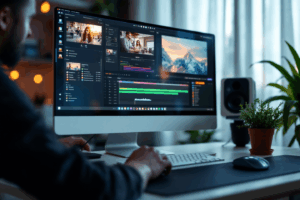 In this guide, we’ll explore how basic video editing skills can benefit various aspects of your daily life. From personal projects to professional pursuits, we’ll show you why this skill is becoming increasingly essential in our visually driven world.
In this guide, we’ll explore how basic video editing skills can benefit various aspects of your daily life. From personal projects to professional pursuits, we’ll show you why this skill is becoming increasingly essential in our visually driven world. 1. Personal Life Enrichment: Video editing allows you to transform ordinary footage into extraordinary stories. Whether it’s a birthday celebration, a family trip, or your child’s first steps, editing helps you create more than just a video; you create a memorable narrative that captures the essence of those moments.
1. Personal Life Enrichment: Video editing allows you to transform ordinary footage into extraordinary stories. Whether it’s a birthday celebration, a family trip, or your child’s first steps, editing helps you create more than just a video; you create a memorable narrative that captures the essence of those moments. 2. Enhancing Social Media Presence: In the age of social media, video content stands out. Editing your videos, even minimally, can dramatically improve their appeal, making your social media posts more engaging and shareable.
2. Enhancing Social Media Presence: In the age of social media, video content stands out. Editing your videos, even minimally, can dramatically improve their appeal, making your social media posts more engaging and shareable. 3. Professional Edge in Presentations:
3. Professional Edge in Presentations: 4. Creative Outlet for Hobbyists:
4. Creative Outlet for Hobbyists: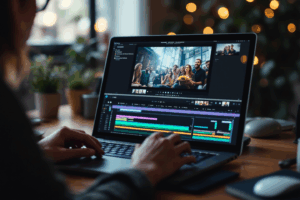 5. Community Engagement: Video editing skills can help you contribute to community events or causes. Creating videos for local events, fundraisers, or awareness campaigns can be a rewarding way to use your skills for a good cause.
5. Community Engagement: Video editing skills can help you contribute to community events or causes. Creating videos for local events, fundraisers, or awareness campaigns can be a rewarding way to use your skills for a good cause. 6. Educational Tool: For students or educators, video editing can transform the learning experience. Educational videos, when well-edited, can make complex subjects more accessible and enjoyable.
6. Educational Tool: For students or educators, video editing can transform the learning experience. Educational videos, when well-edited, can make complex subjects more accessible and enjoyable.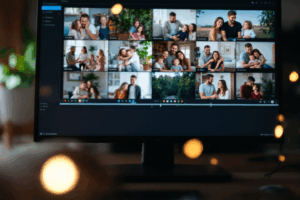 Capturing Life’s Moments: Turn clips from family gatherings, vacations, or everyday life into beautiful narratives. By editing these videos, you create lasting memories, giving life to those fleeting moments in a more dynamic and engaging way.
Capturing Life’s Moments: Turn clips from family gatherings, vacations, or everyday life into beautiful narratives. By editing these videos, you create lasting memories, giving life to those fleeting moments in a more dynamic and engaging way. Vlogging and Personal Branding:
Vlogging and Personal Branding: Travel Videos:
Travel Videos: Special Occasions:
Special Occasions: Hobby Documentation:
Hobby Documentation:  Learning and Skill Development:
Learning and Skill Development:






 Community Events and Activities:
Community Events and Activities: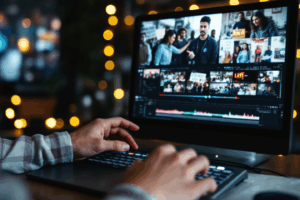 Social Causes and Awareness:
Social Causes and Awareness: Collaborative Projects:
Collaborative Projects: Educational Workshops and Training:
Educational Workshops and Training: Cultural Exchange and Storytelling:
Cultural Exchange and Storytelling:  Networking and Professional Growth:
Networking and Professional Growth: Cultivating Creativity:
Cultivating Creativity: 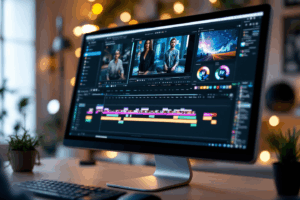 Technical Skill Development:
Technical Skill Development:  Patience and Attention to Detail:
Patience and Attention to Detail: Self-Expression and Storytelling:
Self-Expression and Storytelling:  Lifelong Learning:
Lifelong Learning: Community and Networking:
Community and Networking: Career Advancement:
Career Advancement:
 We encourage you to take the first step on this exciting journey. Embrace the learning process, experiment with your creativity, and watch as your world expands through the lens of video editing. The stories you can tell and the impact you can make are limited only by your imagination. So, dive in, start editing, and see where your creativity takes you.
We encourage you to take the first step on this exciting journey. Embrace the learning process, experiment with your creativity, and watch as your world expands through the lens of video editing. The stories you can tell and the impact you can make are limited only by your imagination. So, dive in, start editing, and see where your creativity takes you.

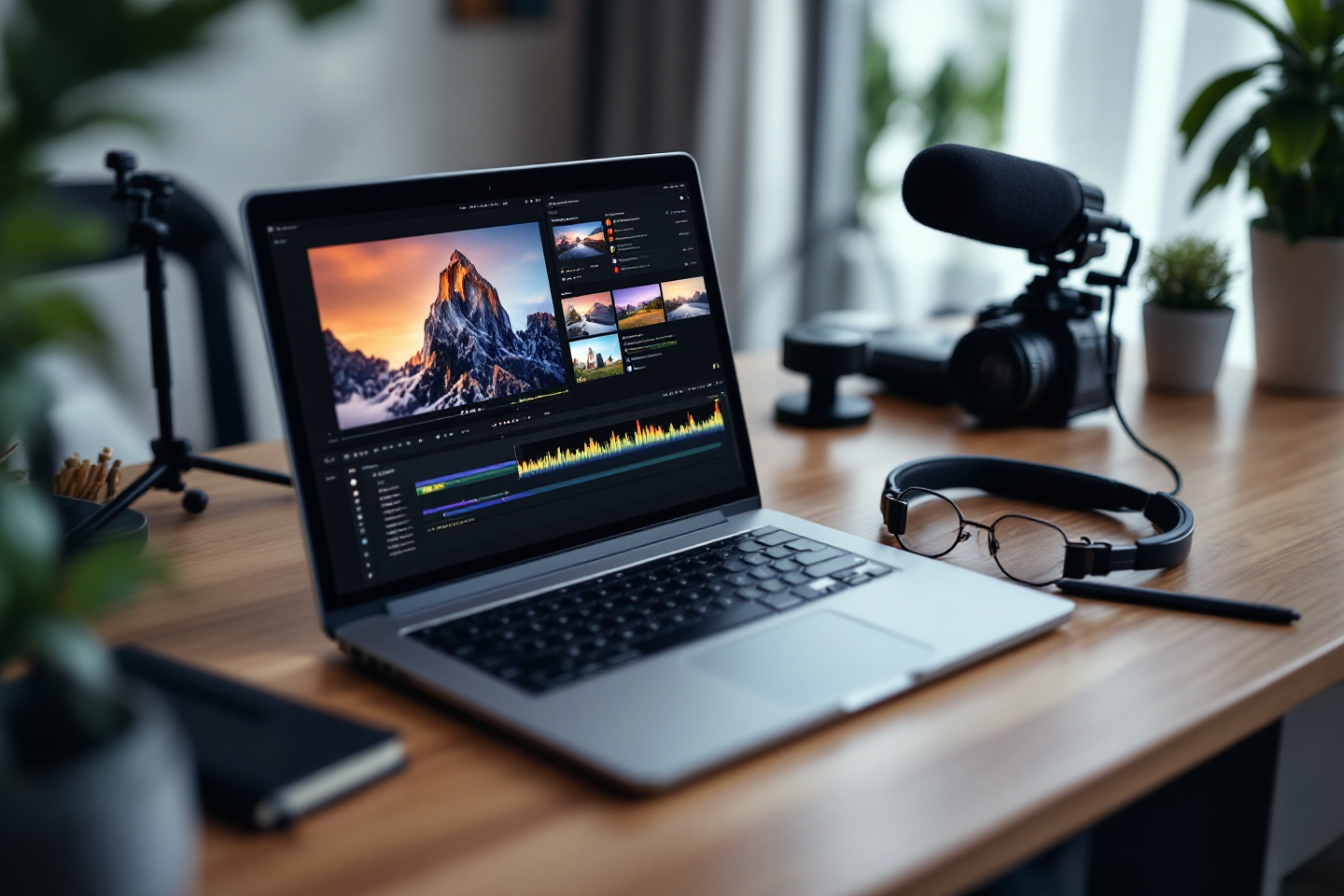
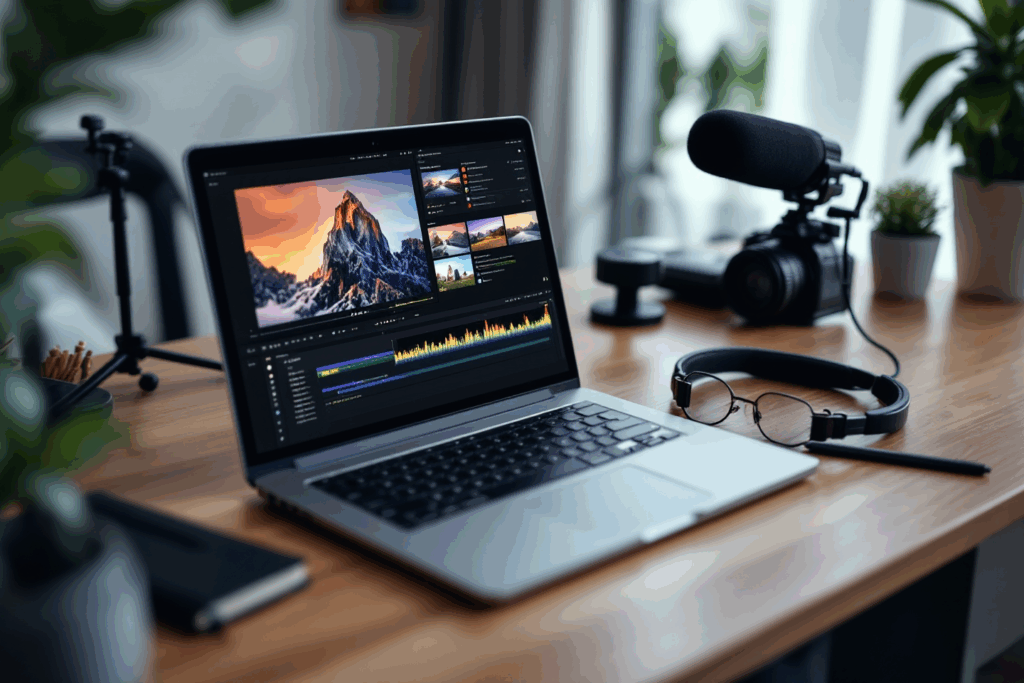
 Video editing, once a skill reserved for professionals with high-end equipment, has become increasingly accessible to anyone with a passion for storytelling and a computer. In this digital age, the ability to edit videos has transformed from a niche technical skill to a versatile tool in everyone’s creative arsenal. Whether you’re aspiring to be a filmmaker, looking to enhance your social media presence, or simply wanting to preserve memories in a more engaging format, learning video editing opens up a world of possibilities.
Video editing, once a skill reserved for professionals with high-end equipment, has become increasingly accessible to anyone with a passion for storytelling and a computer. In this digital age, the ability to edit videos has transformed from a niche technical skill to a versatile tool in everyone’s creative arsenal. Whether you’re aspiring to be a filmmaker, looking to enhance your social media presence, or simply wanting to preserve memories in a more engaging format, learning video editing opens up a world of possibilities. As we dive into this beginner’s guide, remember that everyone starts somewhere. With the advent of free, user-friendly video editing tools, you no longer need expensive software to begin your journey into the art of video editing. This guide aims to demystify the process, introduce you to basic techniques, and help you take your first steps in creating compelling video content.
As we dive into this beginner’s guide, remember that everyone starts somewhere. With the advent of free, user-friendly video editing tools, you no longer need expensive software to begin your journey into the art of video editing. This guide aims to demystify the process, introduce you to basic techniques, and help you take your first steps in creating compelling video content.




 Before you dive into the practical side of video editing, it’s essential to grasp some fundamental concepts. These basics form the foundation upon which all your editing skills will be built:
Before you dive into the practical side of video editing, it’s essential to grasp some fundamental concepts. These basics form the foundation upon which all your editing skills will be built: Remember, the goal of editing is not just about putting clips together but telling a story that engages your audience. As you start experimenting with these basic elements, your unique style and storytelling techniques will begin to emerge.
Remember, the goal of editing is not just about putting clips together but telling a story that engages your audience. As you start experimenting with these basic elements, your unique style and storytelling techniques will begin to emerge.

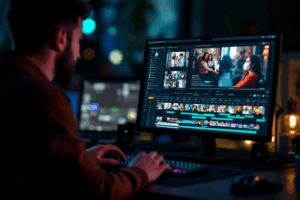




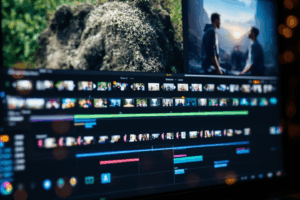


 As we reach the end of this beginner’s guide to video editing, remember that your journey is just beginning. Video editing is not only about mastering software or techniques; it’s about discovering your voice and telling stories in your unique way. The satisfaction of creating something that resonates with others is unparalleled, and every video you edit brings you one step closer to this achievement.
As we reach the end of this beginner’s guide to video editing, remember that your journey is just beginning. Video editing is not only about mastering software or techniques; it’s about discovering your voice and telling stories in your unique way. The satisfaction of creating something that resonates with others is unparalleled, and every video you edit brings you one step closer to this achievement. We encourage you to take the first step today. Download a video editing software, gather some clips, and start playing around. There’s no better way to learn than by doing, and who knows where this journey might take you?
We encourage you to take the first step today. Download a video editing software, gather some clips, and start playing around. There’s no better way to learn than by doing, and who knows where this journey might take you?